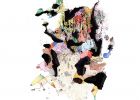Manifesto Anthrobscene
In 1940 on the onset of WWII, Vilém Flusser, his Czech family lost to German concentration camps, left Europe for Sao Paulo to become a Brazilian citizen, where he wrote and taught philosophy until 1972. In 1987, Flusser wrote Vampyroteuthis Infernalis, which one reviewer of the English translation compared to the writings of Jorge Luis Borges. In the spirit of Borges and Flusser, and set in Brazil, Yamashita’s presentation depicts the legacy of colonial processes that continue to destroy native populations, human and non-human, and to conceive of earth as inanimate, blind, mute, and utterly insensible. Divided into two parts, part one re-imagines Oswald Andrade’s “Manifesto Antropofágico” and Jonathan Swift’s “A Modest Proposal,” countering the empiric construction of native people as “savages” and innate cannibals. Part two re-composes a story told by a parrot, whose ancestor had been separated from her mate by Alexander von Humboldt. In 1799, Humboldt is said to have sent a parrot home to Prussia, the parrot being the last keeper of the language of an extinct Amazonian tribe. The descendant parrot and her interlocutor reconstruct a fabula composed in the register of dark humor about the deepest recesses of a forest (or the human id). In this primordial forest—reminiscent of a staging of Pina Bausch’s “Rites of Spring”—a fecund exchange occurs between sightless Mother Tongue and a ravenous Father Penis who “ate the eyes of everything.”











